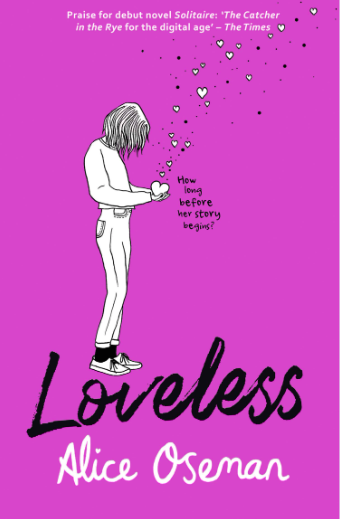Words by Emily Hyatt
When people think of Alice Oseman their first thought goes to the popular British Netflix series, Heartstopper. However, Oseman created another book that grapples with the challenges of being gay and navigating one’s identity. That book is Loveless.
Loveless is about a girl named Georgia who feels out of place because she does not have the same sexual or romantic feelings as her friends. Now that she is going to university, she feels obligated to be like her flirty, charming roommate Rooney. This escalates Georgia’s issues with her identity but pushes her to get outside of her comfort zone, where she talks to and befriends her college dad, Sunil.
Loveless is a powerful book because it acknowledges asexuality, which is a group within the LGBTQ+ community that does not get enough recognition. Asexuality and Aromanticism are terms that not many people know about or associate with the LGBTQ+ community. In school, I was never taught about asexuality and aromanticism, thus I learnt about them through TV. In the book, we see a character shame and belittle Sunil for his acknowledgement of asexuality. This book captures the reality of acceptance within the community. Sometimes people are not open-minded about one’s sexuality because of their ignorance. Moreover, once Georgia educates herself on asexuality and realises that she could be asexual, she begins to feel like she is an intruder rather than a member of the LGBTQ+ community. This captures the trials and tribulations of identity and the acceptance of it. A book like Loveless normalises asexuality and embraces readers who relate to Georgia or struggle with navigating who they are.
One thing that I loved about this book is that it broke away from romantic love and focussed on self-love and platonic love. Towards the end of the book we see Georgia do massive love gestures, express her love towards her friends and accept her asexuality. Not only does this show massive character growth but, it presents a new image of fulfilment to the reader. Mostly, films and stories centred around women end with romance. We see this with films like Honey, Legally Blonde and Save the Last Dance. Thus, reading a book where the main character reaches extreme contentment from their friendships shows the reader that you do not need to seek romantic love and fulfilment. Platonic love lies right in front of us and is even more gratifying. Recently, my flatmate saw that I was busy and desperate for tickets to see the Weeknd, so during my seminar, she spontaneously purchased tickets. At that moment, I knew that I didn’t need to waste time seeking romantic love when I had an abundance of platonic love right next to me.
Another reason why I love this book is that it shows the pressures of “rite of passage moments”. In today’s society, there is a lot of pressure to kiss someone or lose your virginity at a certain stage of your life. Society pressures people like Georgia to do these things despite not having an interest or being ready for it. Once they do these things by society’s standard they end up regretting the moment or feeling shame because it was not done on their terms. Books like Loveless normalise self-reflection, knowing yourself and comfortability within deviating from social norms.
Picture Credits: Alice Oseman courtesy of Harper Collins

